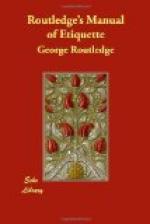When it is considered that the object of nine-tenths of womankind is that they may marry and settle in life, as their fathers and mothers have done before them, it is very natural that they should endeavour to make themselves as captivating as they can; only let them all bear this in mind,—let their rank and station be what it may,—that no man is caught by the mere display of fine clothes. A pretty face, or good figure, may captivate; but fine clothes, never. Though it is said that fine feathers make fine birds, yet no mail will be caught by a trimming or a flounce.
To what end then should attention be given to dress? Why should it be made of so much consequence as to write a manual upon it? Because it is one of beauty’s accessories; because as dress of some kind is absolutely necessary and indispensable, it is better that people of all classes should dress well rather than ill, and that, when it is done, it should be done sensibly and reasonably; without carelessness on the one hand, and without extravagance on the other. When we may, why should we not choose the best and most becoming? Why are we to mortify ourselves and annoy our friends by choosing something because it is especially hideous? No law, human or divine, enjoins us to disfigure ourselves.
* * * * *
II.—TASTE IN DRESS.
In dress, as in most other things, there are two kinds of taste; good taste and bad taste. We use the word “taste” in a sense quite distinct from “style.” It is a disputed point whether really good taste can ever be acquired, or whether it is only inherent. We are disposed to think that, in its most perfect form, it is inborn; but that education, association, familiarity with it may, and often does, arrive at the same result. For instance, a person who has always lived on close and intimate terms with those who are conspicuous for their good taste, becomes so familiarized with certain expressions of thoughts and ideas, habits of mind, and standard of life, that he unconsciously adopts them, views things from the same point, and walks in the same groove, quite irrespective of the natural tendencies of his own mind. Persons who have no natural gift or talent for painting, may acquire a knowledge of the art so as to pronounce with tolerable correctness of judgment upon the works of the old masters, from merely associating with those who are conversant with the subject, living amongst the pictures themselves, or from hearing discussions upon their respective merits. In fact, man is an imitative animal, and can adapt himself very readily to the circumstances by which he is surrounded, as well as acquire from others the results of their deeper research and greater experience. Living in an atmosphere where good taste prevails, it is not wonderful that he should acquire that power of discrimination by which the selection of what is becoming and harmonious is made easy.




